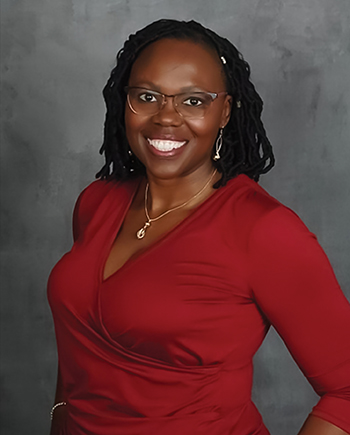Multiple Myeloma Survivor
Inspiring hope became her passion

When Valarie Traynham was diagnosed with multiple myeloma at 42, she had no idea raising awareness for a disease she had not heard of would become her life’s passion. Today, she channels that drive into educating others, leading a myeloma support group and community chapter for African Americans, moderating a myeloma Facebook group, speaking at health fairs and coaching others with this disease.
When I was diagnosed, I didn’t know anything about multiple myeloma. I’ve made it my mission to educate and support others with this disease, so they won’t feel alone. I don’t want anyone to feel the same way I did.
My experience started innocently as just a nose bleed one night while I was on my computer. It happened again a few more times, but it wasn’t something I thought I needed to see a doctor for. I also developed frequent urinary tract infections and other infections around the same time. The final symptom that sent me to the doctor was when I thought I was having a bout with the flu. When it went on for three weeks, I knew it had to be more than the flu.
My primary care doctor ordered blood work, and it showed I had a high protein level. She referred me to a hematologist right away. I wasn’t concerned because I’d had anemia before. I met with the hematologist, expecting to receive some iron supplements, but I walked out with a cancer diagnosis. I had never heard of multiple myeloma.
Out of fear, I rushed into treatment. I had one cycle of a combination chemotherapy regimen. My friends encouraged me to get a second opinion because I knew very little about this disease. I am so glad I did, and I realized how important it is to find a specialist. The specialist made me feel at ease from the moment we met because he told me things I needed to know. He explained that he felt a newer regimen with the possibility of doing a stem cell transplant in the future would be a better treatment plan. I started the new therapy and had the transplant a year later.
When I was first diagnosed, doctors said the average life expectancy of someone with multiple myeloma was 3 to 5 years. I was frightened and dismayed. I knew I couldn’t go through this alone, so I found a myeloma support group through the International Myeloma Foundation and it felt like home. I also met a 26-year survivor at a patient summit meeting. He was so inspiring and optimistic. He offered so much hope that it changed the course of my life.
Almost a year after joining the group, I was asked to take over the leadership of the support group because the young lady who had been running it had to step down when her myeloma returned. I accepted the position and discovered that patient education was my passion, and it kept my mind off my disease. Helping others brings me so much joy. I enjoy talking about it and removing the stigma from the disease.
My whole journey shifted once I became an advocate for others. In addition to leading the support group, I later became a Myeloma Coach for the HealthTree Foundation, a non-profit organization dedicated to supporting patients with blood cancers. I lead the Black Myeloma Health Chapter within HealthTree. I also volunteer as a Mentor Angel with Imerman Angels, another non-profit organization, and with Cancer Fighters. I moderate a multiple myeloma Facebook group for African Americans. Part of my newfound mission is to help educate the African American community about what this disease is and to provide them with support.
A few years after my diagnosis, a routine mammogram showed I had Stage I breast cancer. I didn’t need radiation therapy because there was no lymph node involvement, but I did have a mastectomy and four rounds of chemotherapy. The doctor believes this was a secondary cancer that developed as a result of my multiple myeloma treatment. Today, I am on maintenance therapy for my myeloma and continue to be monitored.
My goal is to prevent others from feeling alone or having no hope like I did when I was first diagnosed. Today, so many more treatments are available to help manage multiple myeloma like a chronic disease. I believe there will be a cure in my lifetime. There is hope!
Valarie’s Advice
• Learn how to be your own best advocate. Speak up for yourself. Make your needs known.
• Become an educated patient. Knowledge is power.
• Know that you are not alone.
• Connect with other multiple myeloma patients. Finding that community improves the situation so much.
• Join a good support group that will listen to you, answer your questions and be there for you. They aren’t all doom and gloom. Find one that is uplifting and hopeful.


